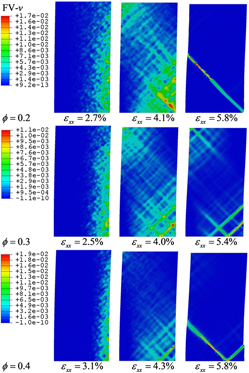Article contents
Effect of testing conditions on the compressive plasticity of bulk metallic glasses
Published online by Cambridge University Press: 19 August 2016
Abstract

In this paper, the compressive behaviors of Zr-based bulk metallic glass (BMG) were experimentally studied under different testing conditions. To deeply reveal the inherent deformation mechanisms, numerical study was systematically conducted to analyze the shear banding evolution in BMGs, and the effect of testing machine stiffness, contact friction, and sample parallelism on the compressive ductility was therefore elucidated. Among them the effect of contact friction was carefully studied experimentally and the inherent deformation mechanisms was numerically analyzed in terms of the formation of shear bands. Free-volume theory was incorporated into ABAQUS finite element method code as a user material subroutine UMAT. The numerical method was firstly compared with the corresponding experimental results, and then parameter analyses were performed to discuss the impacts of testing conditions on the malleability of the BMG samples. The present work will shed some light on the interpretation of failure mechanisms in BMGs under different loading conditions.
Keywords
Information
- Type
- Articles
- Information
- Copyright
- Copyright © Materials Research Society 2016
References
REFERENCES
- 3
- Cited by


